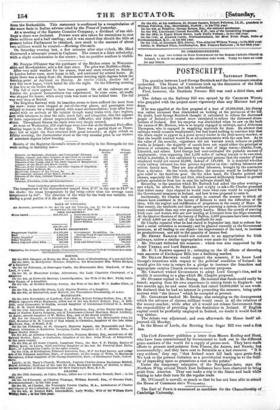POSTSCRIPT.
SATURDAY NIGHT.
The question between Lord George Bentinck and the Government remains undecided. The House of Commons took up the discussion of the Irish Railway Bill last night, but left it unfinished.
First, however, the Destitute Persons Bill was read a third time, and passed.
The debate on the Railway Bill was opened by Sir CHARLES WOOD; who grappled with the project more vigorously than any Minister had yet done.
If he was appalled at the first proposal of a loan of 16,000,0001., his dismay was rather increased than dimimahed on looking at the provisions of the bill.
No doubt, Lord George Bentinck thought it calculated to relieve the distressed
people of Ireland ;—it seemed more calculated to relieve the distressed slime- holders of Ireland. But his surprise was diminished when he saw on the back the names of Mr. Hudson, who is so largely engaged in railways, and of Alderman Thompson, who is engaged in supplying materials for them. Be allowed that railways would occasion employment; but had heard nothing to convince him that the State ought to appear as a great money-lender in the Irish money-market, Cr that the benefit realized would be at all commensurate with the sum lent. As to the value of the security, experience did not warrant much reliance on public works in Ireland: the majority of canals have not repaid either the principal or interest of advances; and the same may be said of large towns—Dublin Corkt Limerick, and others. Lord George had over-estimated the probable amount of employment: even supposing that 1,500 miles of railway remain to be executed, which Is doubtful, it was calculated by competent persons that the number of men employed would not exceed 45,000, instead of 110,000. It is doubtful whether every railway labourer has four persons dependent on him: railway labourers rut seldom family men. They are also skilled labourers, brought by the contractor from a distance. On the whole, therefore, the measure would be ineffectual to give relief to the destitute poor. On the other hand, Sir Charles pointed out clauses, especially the 29th and Slat, which seemed deliberately framed to protect private speculators from loss in case the railways should fail.
Recurring to the question which Mr. Roebuck had asked the other evening= and which, he allowed, Mr. Roebuck had a right to ask—Sir Charles promised that before many days elapsed he would state what sum would be required for the Government measures in Ireland, and how it was proposed to raise it. Incidentally, Sir Charles took occasion to contrast the manner in which all classes have combined in the barony of Ki1more to meet the difficulties of the time, with the neglect and indifference of proprietors in the county of Mayo. In that county, the landlords and their agents are pursuing a system of ejectment fax more considerable than any ever previously known. Hence the crowds of starving Irish men and women who are now landing at Liverpool from the Sligo steamers. At the Quarter-Sessions of the barony of Baffina, 6,400 processes have been entered, of which 4,000 are at the suit of the landlords for rent.
Sir Charles repeated what he had stated in September last, that to redeem Ire- land a social revolution is necessary; and he glanced cursorily at the Government measures, as all tending to one object—the improvement of the land, to increase its productiveness, and add to the quantity of human food.
Mr. HENRY BA1LLIE would not consent to an appropriation for Irish railways, nless a similar appropriation were made for Scotland. I Mr. STUART defended the measure ; which was also supported by Sir Joan TTRELL and Lord BERNARD.
Mr. F. T. Beanna opposed it ; enlarging on the ill effects of throwing vast amounts of Exchequer Bills into a declining market.
Mr. Dnacin Bnowzm would support the measure, if he knew Lord George's intentions with respect to the political condition of Ireland: he would give his vote in return for a pledge to increase the franchise and appropriate surplus Church revenues to secular purposes.
Mr. CHAPLIN wished Government to adopt Lord George's idea, and to modify it according to a plan which Mr. Chaplin proposed.
Mr. HUDSON replied to Mr. Baring. He insisted that funds could easily be found; arguing from his own experience in raising funds in England: not two months ago, he and some friends had raised 10,000,000L in one week. He declared that he had no interest in promoting the measure, being quite content with "the throne" which he occupied at present.
Mr. GOULBURN backed Mr. Baring; also enlarging on the derangemallt which the advance of sixteen millions would cause in all the relations of the money-market; while after all it would not release Government from the responsibility of providing for the destitution in Ireland. If English capital could be profitably employed in Ireland, no doubt it would find it way thither.
The debate was adjourned; and soon afterwards the House itself ad- journed till Monday.
In the House of Lords, the Brewing from Sugar Bill was read a first inns.


























 Previous page
Previous page